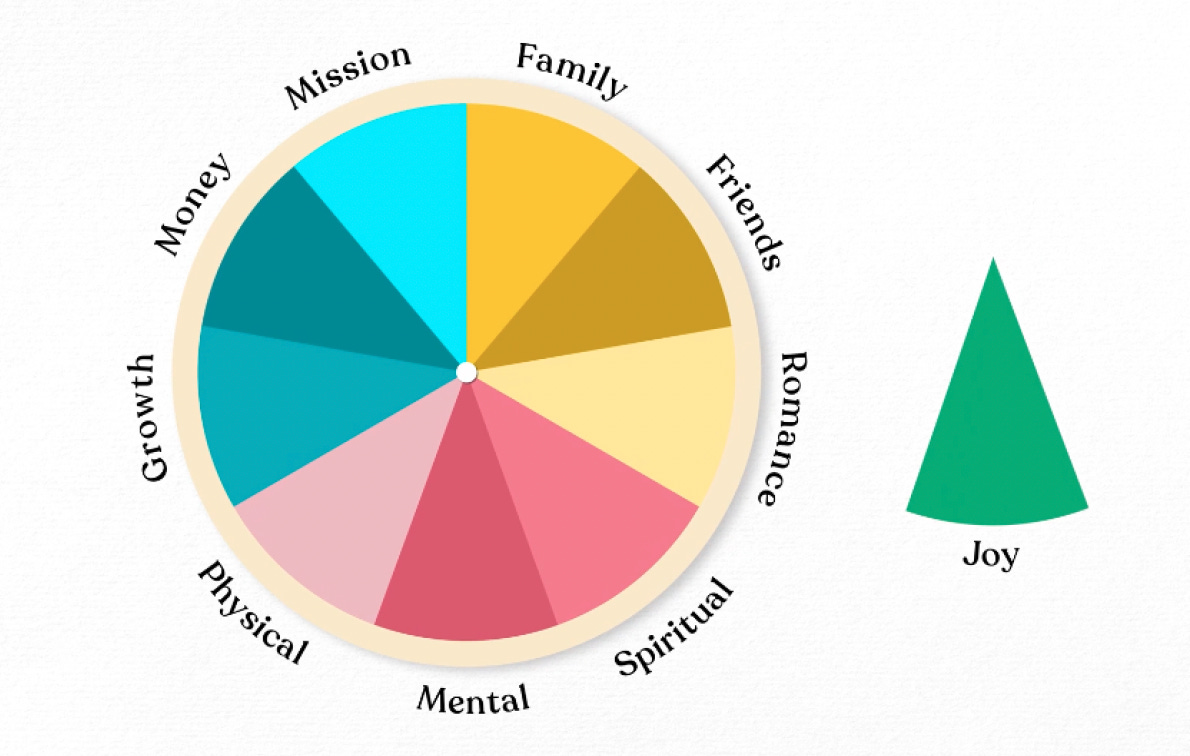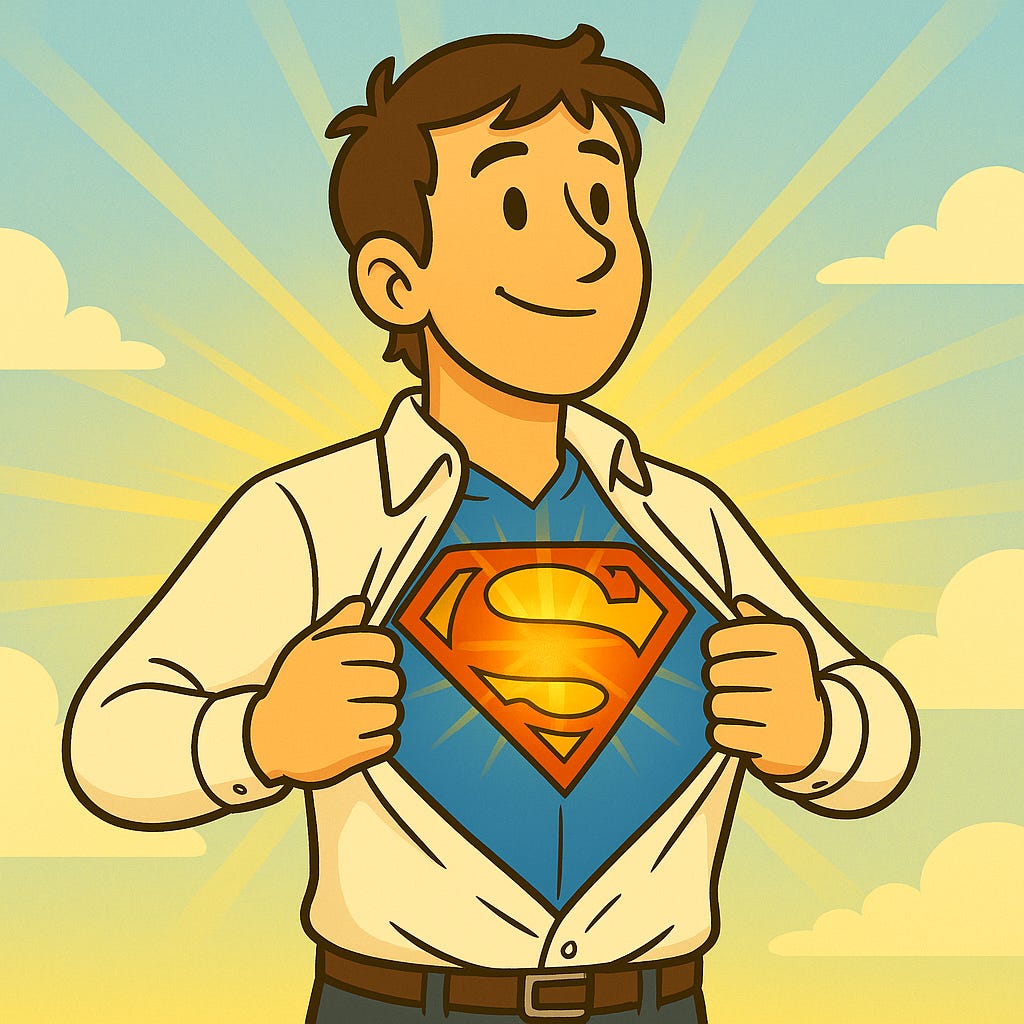Finding Your Superpower (Even When You Think You Don't Have One)
The simple framework that helped me move from the "jack of all trades" cop-out to a crystal clear purpose
Yesterday, I got asked a question that stopped me cold.
In a long overdo catch-up with my friend Rhett, I was doing what I always do when asked about my work skills. I launched into my usual spiel:
"I'm a jack of all trades. I can handle any task and do it well. I'm really good at..."
He cut me off mid-sentence.
"Brady, no. No, no, no. That's not your superpower."
Confused, I felt a hint of annoyance rise up within me.
What did he mean that wasn't my superpower?
Being versatile and capable seemed like exactly the kind of thing you'd want in an employee or teammate.
"You're an intelligent, ambitious, highly-capable young man," Rhett continued. "I'd hire you to do any job in the world. But you need to think about and identify what YOUR superpower is specifically.
What you are good at, but also because you're young, what do you WANT to be good at?"
That question hit different.
The Problem with Being Good at Everything
Here's what I realized in that moment:
Calling myself a "jack of all trades" is actually a cop-out.
It's safe.
It's vague.
And it doesn't require me to make any hard choices about who I want to become.
When you say you're good at everything, you're really saying you haven't figured out what you want to be great at.
You're playing it safe by staying on the surface level of a dozen different skills instead of diving deep into the one or two things that could actually set you apart.
But more importantly, you're avoiding the scarier question:
What do you want to be known for?
The Real Purpose of Finding Your Superpower
Here's the thing about identifying your superpower.
The specific answer might change as you grow and evolve.
What you think is your superpower at 25 might look completely different at 35. And that's okay.
The real value isn't in getting the "right" answer.
It's in the exercise itself.
When you're forced to identify your superpower, you have to do something most people avoid:
Get specific about what you're actually good at and what you want to develop.
You have to move beyond generic strengths and dig into the intersection of your natural talents, your interests, and your potential for mastery.
It forces you to be honest about what energizes you versus what just pays the bills.
It makes you think about where you want to direct your energy instead of just reacting to whatever task comes your way.
How to Find Your Actual Superpower
After that conversation, I spent the next few days really digging into this question, and honestly, what I discovered surprised me.
I was able to find some clarity, and I want to share the process I went through because I think it could help you, too.
Start with Energy, Not Skills
Don't begin by listing what you're technically good at. Start with what gives you energy.
Think about the last time you were completely absorbed in something for hours without feeling drained.
What were you doing?
What part of it made time disappear?
For me, it was writing for Soul Mana. I'd sit down to write and suddenly four hours had passed, but I felt more energized than when I started.
That was a clue.
Look for Patterns in What People Ask You
Pay attention to what people consistently come to you for help with.
Not just work tasks, but the kinds of problems where people think "I should ask [your name] about this."
People kept bringing me complex, unclear problems to solve. Whether it was figuring out HubSpot reporting, organizing messy business processes, or building new ones from scratch.
The pattern wasn't the specific skill, it was that they trusted me to make sense of complicated things.
Find the Intersection
Your superpower lives at the intersection of what energizes you, what people already trust you with, and what you want to become known for.
For me, that intersection was clear:
I transform abstract ideas into tangible reality that delivers value to people.
Here's my process:
Capture the mess.
When people bring me those complex, unclear problems, I don't just try to solve them immediately.
I sift through all the chaos to understand what the real problem actually is. I give it a definition, call it out, make it concrete.
Build quickly.
We get the minimum version built to give it legs, make it real QUICK.
No perfect plans, no endless planning sessions. Just get something tangible that we can actually work with.
Then comes the best (and scariest) part…
Put it in front of people.
Put it to the test, break it, let it expose its flaws.
Like metal through the forge - the heat reveals exactly where it needs to be strengthened.
And then? Perfect it.
Exactly in the places where it needs to be fixed, staying hyper-focused on what changes actually matter.
Ask the Harder Question
This is the part most people skip:
What do you WANT to be good at?
Not just what you're currently capable of, but what would you want to master if you knew you couldn't fail?
This question forces you to think beyond your current limitations and consider what kind of impact you want to have.
It's forward-looking instead of just reflective.
A Tool to Guide Your Way
If you're struggling to get clarity on what you want, here's a helpful exercise from Ali Abdaal's Think Day framework.
Start by drawing what he calls the "Wheel of Life"

For each category, rate your current satisfaction from 1-10 and plot it on your circle. This gives you a snapshot of which areas feel strong and which need attention.
More importantly, it helps you see where you might want to direct your superpower.
But once you've done that assessment, Ali asks a question that will stop you in your tracks:
What would you do with your life if you knew you couldn't fail?
Sit with that for a moment.
Not what you think you should do.
Not what would be practical or safe or make your parents proud.
What would you actually pursue if failure were impossible?
Don't overthink it.
Write down the first thing that pops into your head, before your brain tries to talk you out of it.
Link to the full doc & video below.
Why This Matters More Than You Think
Once you can articulate your superpower clearly, and have clear vision on what you’re aiming towards, everything changes.
You start saying no to opportunities that don't develop that core strength.
You begin to see connections between seemingly unrelated experiences.
You can communicate your value more clearly to others.
But most importantly, you start making decisions based on who you want to become instead of just reacting to what's in front of you.
Your superpower might evolve, but the clarity you gain from this exercise doesn't disappear.
It gives you a lens for evaluating opportunities and a framework for intentional growth.
Your Turn
Here's my challenge to you.
Stop hiding behind versatility.
Stop hiding behind vagueness.
Instead, spend some time this week thinking about these questions:
What activities completely absorb your attention in the best way?
What problems do people consistently trust you to solve?
What intersection of skills and interests could you develop into something truly distinctive?
And then the harder question:
What do you want to be known for five years from now?
Your superpower is already there.
Don’t be afraid to claim it.
What's one thing you're naturally good at that you've been taking for granted? Hit reply and let me know! I read every response.
Ali Abdaal’s full Think Day Plan document with a link to his video about the topic:



